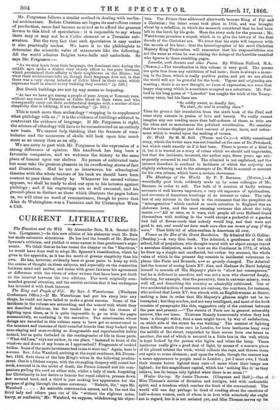France on the Eve of the Great Revolution. By Admiral
Sir G. Collier. (Bentley.)—A very thin book. The Admiral, a gentleman of the old school, full of prejudices, who thought travel with no object except travel a senseless dissipation, made a tour on the Continent in 1773, of which he drew up a simple and unaffected, but rather dry account, the whole value of which in the present day consists in incidental references to • places like Paris and Brussels, now so greatly changed. The Admiral had the honour of seeing Louis XV. dine, and Madame du Barri helping herself to morsels off His Majesty's plate to " show her consequence," but he is deficient in anecdote, and was not a man who observed deeply, believing, for example, that the peasantry, then in extreme misery, were well off, and describing the country as admirably cultivated. One or two accidental notices of manners are curious, the courtiers, for instance, who noticed that Louis XV. was struck with an Englishwoman at dinner, making a lane in order that His Majesty's glances might not be in- terrupted ; but they are few, and not very intelligent, and most of the book consists of paragraphs like this, suggestive only of the contrast between the past and present :—" The streets of Paris are in general miserably narrow, like our lanes. Tristram Shandy humorously wishes they had been a thought wider, that a man might know, by way of satisfaction, on which side of the street he was walking.' The manner of lighting them differs much from ours in London, for here lanthorns hang over the middle of the street, suspended by lines across from one house to another, the end of which is secured in a little box in the wall, which is kept locked by the person who lights and trims the lamp. These lanthorns really give a good deal of light, by means of a concave piece of tin placed behind the wick, which collects the rays, and throws them out again to some distance ; and upon the whole, though the manner has a mean appearance to people used to London ; yet I must own, I think their streets better lighted than ours—I mean when their lamps are lighted ; for this magnificent capital, which has nothing like it,' as they believe, has its lamps only lighted when there in no moon ! "






























 Previous page
Previous page